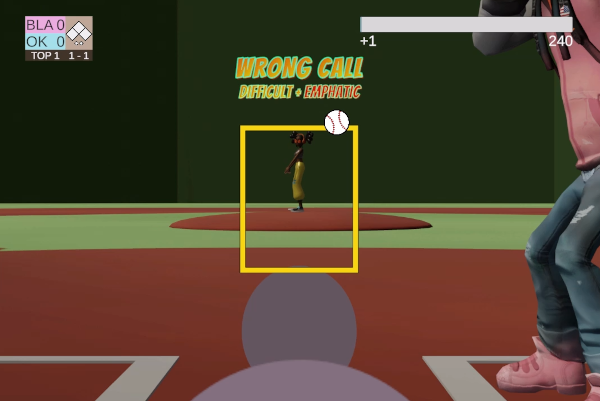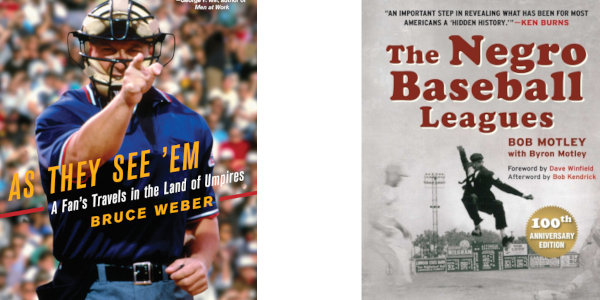As 2022 is coming to an end, I wanted to reflect on things I did this year.
Projects
The Ump Show
“The Ump Show” is a phrase used derisively to mock baseball umpires when they take actions that bring them too much attention like arguing with managers or ejecting players. The phrase gave me the idea of making a game in which you play as a baseball umpire. So really the game would be the ump show.
I have been working on-and-off on this game since April. Here are some pictures of the progress:




I am hoping that I can keep this game fun without adding too many mechanics so that I can actually finish it. Hopefully, I can release a playable version in 2023!
Wheelie
After playing the game Old Man’s Journey (which is a beautiful game), I started thinking about 2D animation again. So I decided to experiment with 2D animation tools and make some animation. I started with the idea of making a rotating wheel. A simple rotation would be boring though, so I wanted the wheel to be squished at the bottom and angled forward as it was rotating.
This turned out to be surprisingly difficult. I experimented with many tools: Spriter, DragonBones, SynFig, and OpenToonz but I couldn’t get them to work for me. So I went back to the tools I was already familiar with: Blender and Unity.
Vigorish
A friend of mine, Danny Guo, and I had the idea of a tool to help you track your personal predictions. The goal was to force you to write down your predictions so that over time you can learn your biases and improve. Over a couple of weeks, we hacked together a prototype using NextJS and fly.io.

The webapp is available at vigorish.fly.dev and the code is available at GitHub. While building this we did consider adding “public” events that everyone can participate in but we found a few applications in this space already (Manifold is even open source), so we kept it minimal and left it there.
Writing
I wanted to write more, partly to practice my writing and partly to produce artifacts that I can enjoy. I like explaining things so I enjoyed writing the post on degenerate matter. Making the visualizations particularly brought me a lot of satisfaction.
I usually experiment with a lot of different things in tech. So I was glad that in the past year I was able to write a few posts as a result of that experimentation: homomorphic encryption, opensource AI tooling, and C++ templating
Books
General Nonfiction

- Word by Word: This was my favorite book of the year. The author’s excitement about words and language made me excited to read more. The book explains how dictionaries are made but through the journey, the author shares many amusing anecdotes and informative bits. My favorite was learning that sideburns are named for a dude named Burnside.
- The Art of Game Design: This is a great book that talks about the numerous aspects of game design. All the different chapters of the book connect and kinda build out the author’s view of game design.
- Misbehaving: The Making of Behavioral Economics: Most of the book covers the development of Behavioral Economics as a field: the difficulty of showing that human behavior is not fully rational and its impact on large-scale economics.
- The Triumph of Seeds: The book doesn’t go too deep but shares how all seeds solve the same problems (storage, protection, travel) in so many different ways.
- Liquid Rules
Baseball Umpire Research
As I started working on The Ump Show game, I wanted to learn more about baseball umpires. It turns out there are A LOT of books about baseball umpires (mostly autobiographies/memoirs).

I read three books end-to-end:
- As They See ‘Em: This was by far the most illuminating book. A big reason for that is that the author is a journalist. The author is very thorough: citing other books, numerous interviews with MLB umpires, and his own experience with umpire training.
- The Negro Baseball Leagues: Tales of Umpiring Legendary Players: This book is by one of the last umpires from the Negro Baseball League. The book provided a good view into the logistics of “old baseball”. For example, the home team was responsible for hiring baseball umpires instead of a central league. The book doesn’t intentionally highlight it but it gives a sense of the popularity of the Negro Baseball Leagues and its slow downfall as star players start being recruited into the MLB.
- The Umpire Is Out: Dale Scott talks about his journey into baseball umpiring from the minors to the majors. He also covers the drama of the umpire union collapsing and its aftermath. Being gay in a conservative culture of umpires is tough and the author shares that perspective as well.
I also referenced a whole bunch of other books that the NYPL had.
- Standing the Gaff: Book by “Steamboat” Johnson who started umpiring in 1909! Published this book in 1935.
- They Called Me God
- In The Ballpark
- Umpire Strikes Back
- The Men In Blue
- You’ve Got to Have Balls to Make It in This League: The author was the first female umpire in baseball and she discusses the consistently poor treatment she received and how the league eventually pushed her out of umpiring.
- Planet of the Umps
Fiction: Discworld
Continuing with the Discworld series, I read Interesting Times, Maskerade, and Feet of Clay. The series continues to entertain!
Articles
I read articles pretty regularly. Most of the random assortment of articles I find are from Hacker News and Reddit. Over time, I have come to appreciate specific authors and I try to read everything they publish.
Authors
- Matt Levine: Matt and I joined Bloomberg around the same time. Embarrassingly, it took Elon buying Twitter (and then not and then not not) for me to hear of Matt Levine’s Money Stuff. It’s a daily newsletter and each one is informative and hilarious.
- soatok: Security researcher who writes about complex topics in easy to understand ways. Recommendations:
- Bits About Money by patio11/Patrick McKenzie: Patrick is great at sharing interesting and weird tidbits from a world that can potentially seem mundane. Recommendations:
- Bartosz Ciechanowski: Explanations with wonderful interactive graphics. These posts were my inspiration for my post on the degenerate matter.
Specific Articles
- 5-HTTLPR: A Pointed Review: Example of when academia can be just as stupid and hype-driven as the regular world, even in the face of contradicting evidence.
- Reuters: How mercenary hackers sway litigation battles
- Why skyscrapers are so short: “The height of skyscrapers is limited by physical, economic and regulatory barriers”
- The 30-Year Mortgage is an Intrinsically Toxic Product: My main takeaway was the argument about how housing prices are coupled to local wages. If the local wages go down, housing value goes down. So when we encourage people to take mortgages, we are asking them to double down and make a leveraged bet on the local market instead of diversifying.
- The Pragmatic Engineer: Inside Fast’s Rapid Collapse: In retrospect, this story can be seen as an early sign of the end of the easy money in the Tech startup world
- ChatGPT, rot13, and Daniel Kahneman: Short post that highlights one area that large-language models are still bad at
More Technical
- MarkovJunior: A project that allows you to create intricate designs/systems with simple rules (like cellular automata)
- How to date a recording using background electrical noise: I just love this idea. It’s a bit of physics, a bit of math, and a fun feeling of being a detective.
- C++ exceptions are becoming more and more problematic: Over the years, I have heard a lot about how exceptions can slow down C++ but it was good to find a read that explained that in more detail.
- C Isn’t A Programming Language Anymore: Argument about how the language’s biggest contribution is the universal binary interface that everything relies on